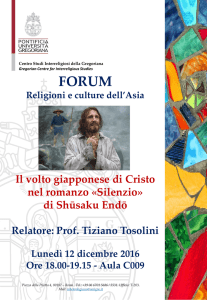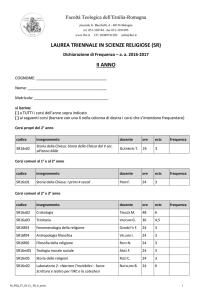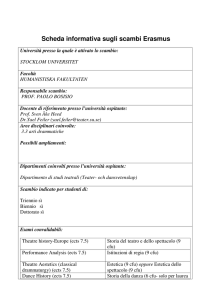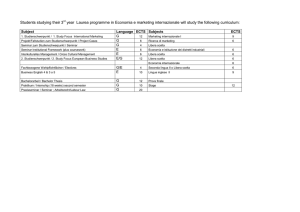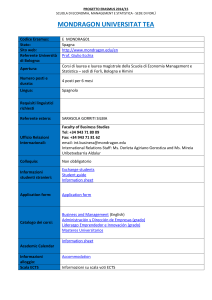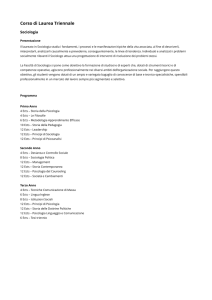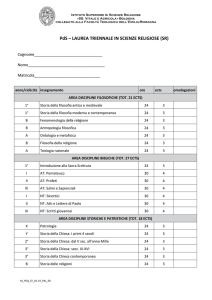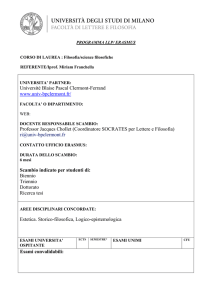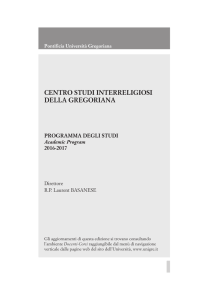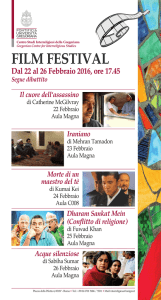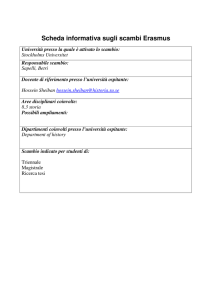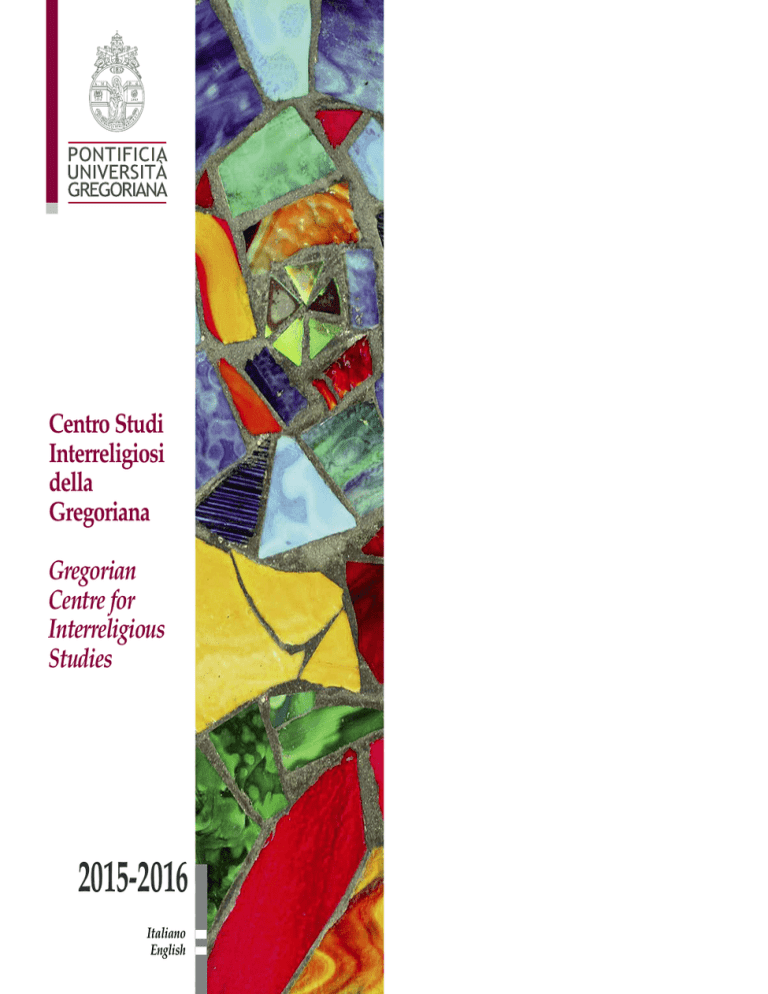
Centro Studi
Interreligiosi
della
Gregoriana
Gregorian
Centre for
Interreligious
Studies
2015-2016
Italiano
English
Centro Studi Interreligiosi
La Formazione al Centro Studi
Interreligiosi della Gregoriana
Il Centro
Lo scopo della formazione nel Centro Studi
Interreligiosi della Gregoriana è di chiarire le numerose questioni relative al rapporto tra Cristianesimo e
Islam, o tra Cristianesimo e Religioni e culture
dell’Asia, in un mondo sempre più globalizzato. Lo
studio comparativo permette di acquisire le conoscenze storiche, filosofiche, teologiche e politiche necessarie all’analisi delle relazioni interreligiose, all’argomentazione e al dibattito costruttivo.
I destinatari
Gli studenti del Centro - laici, sacerdoti, religiosi - possono conseguire il Diploma in Studi Interreligiosi
della Gregoriana (2 semestri, 60 ECTS). Il piano di
studi per il Diploma è preparato con il Direttore e la
sua equipe, in collaborazione con le varie Facoltà e
Istituti dell’Università.
Lungo il percorso, è dato rilievo ai lavori scritti che
permettono di verificare la riflessione e l’assimilazione
personale compiute. Ogni studente è accompagnato
dall’equipe del Centro che lo orienta per la scelta degli
elaborati, delle letture personali e per la redazione del
Dossier finale. In particolare:
• I Corsi (24 ore) e i Workshop (12 ore) si svolgono
secondo una pedagogia differenziata ma richiedono
lo stesso investimento. Entrambi si concludono di
solito con un esame. Nei Workshop è necessaria una
partecipazione attiva e un lavoro personale maggiore.
• Un gruppo di lettura semestrale composto da 3-6
studenti si raduna regolarmente per riflettere a partire da un autore, su un’opera importante o su un
tema interreligioso.
• La partecipazione agli eventi dell’Università e del
Centro, in quanto studente o in quanto relatore, permette di imparare il valore del dibattito e di apprezzare un pensiero. Questi eventi possono essere di
vario tipo: accademico (conferenza), estetico (film,
musica), testimoniale, di commento dell’attualità,
etc.
La pedagogia
• Ogni semestre, lo studente scrive un elaborato di 78 pagine di qualità su un argomento di suo interesse
sotto la guida di un docente. Lo scopo dell’elaborato è quello di approfondire una questione precisa
sulle tematiche interreligiose e di imparare a renderne conto in modo argomentato.
Alla fine dei due semestri, lo studente sintetizza lo
studio realizzato con un Dossier di sintesi.
• Gli studenti iscritti al Centro Studi Interreligiosi
della Gregoriana hanno accesso alla Biblioteca
del’Università (1 milione di volumi) e ad altre
Biblioteche specializzate.
La pedagogia del Centro si basa su quattro pilastri:
• un insegnamento fondamentale: Corsi e Workshop
su due semestri
• i gruppi di lettura
• la vita intellettuale, cui contribuiscono i vari eventi
universitari e le proposte del Centro
• le letture personali e gli elaborati.
• Il Dossier sintetico, alla fine dei due semestri, mette
in rilievo il lavoro compiuto: presentazione dell’itinerario, bibliografia personale (libri, articoli letti),
valutazione dei gruppi di lettura, percorso intellettuale, prospettive. Il Dossier costituisce materia di
interrogazione nella Prova orale dell’Esame finale.
3
Crediti:
• Corsi e Workshop: 3 ECTS
• Altro Corso : 2 ECTS
• Gruppo di lettura: 1,5 ECTS
• Elaborato semestrale: 4 ECTS
• Dossier sintetico del Diploma e Prova orale: 5+7
ECTS
Diploma (2 semestri, 60 ECTS):
• 11 Corsi e Workshop del Centro: 33 ECTS
• 2 altri Corsi: 4 ECTS
• 2 Gruppi di lettura: 3 ECTS
• 2 Elaborati: 8 ECTS
• Dossier sintetico del Diploma e Prova orale: 12
ECTS
Le Sessioni intensive
Il Centro offre brevi Sessioni intensive di formazione
in relazione all’Islam e alle Religioni e culture
dell’Asia, due volte all’anno. Per maggiori informazioni, consultare www.unigre.it/interreligious.
I Forum del Centro Studi Interreligiosi
della Gregoriana
Per conoscere il programma degli eventi organizzati
dal Centro, si rimanda al sito dell’Università:
www.unigre.it/interreligious.
Centre for Interreligious Studies
The Formation At The Gregorian Centre
For Interreligious Studies
The Centre
The purpose of the Centre for Interreligious Studies at
the Gregorian University is to clarify the many questions about the relationship between Christianity
and Islam or between Christianity and the Religions
and Cultures of Asia, in an increasingly globalized
world. The comparative study helps towards a historical, philosophical, theological and political knowledge necessary to analyse interreligious relations,
arguments and debates.
Target audience
The students of the Centre - laity, priests, religious –
are eligible to receive the Diploma in Interreligious
Studies at the Gregorian (2 semesters, 60 ECTS). The
curriculum towards the Diploma shall be prepared by
the Director and his team, in collaboration with the
various Faculties and Institutes of the University.
Pedagogy
The pedagogy of the Centre is based on four methods:
• Instruction on fundamental topics: Courses and
Workshops in two semesters
• Reading groups
• Intellectual life, thanks to the various University
events and the activities offered by the Centre.
• Personal readings and assignments.
At the end of the two semesters, the student recapitulates the study carried out with a Dossier.
5
The goal of the written works demanded from the
students is to verify the personal reflections and
assimilation of the material taught. Each student is
accompanied by a team of the Centre who directs the
choice of the projects, personal readings and the
preparation of the final Dossier. In particular:
• Courses (24 hours) and Workshops (12 hours) are
provided with a different pedagogy but require a
similar insertion. Both would usually conclude with
an examination. It is expected of the student to
actively participate in the Workshops that would
require more personal work.
• Every semester, a Reading Group of 3-6 students
meets to reflect on an author or an important work
or on any interreligious theme.
• Participation in the events of the University and
the Centre, as a student or as a speaker, would help
to value the importance of debate and to appreciate
various creative concepts and thoughts. These
events can be of various types: academic (conferences), aesthetic (movies, music), testimonies,
reflections on current events, etc.
• Each semester, the student writes an essay of 7-8
quality pages on a topic of his or her interest under
the guidance of a Professor. The aim is to deepen
one's knowledge on a precise topic on interfaith
issues and learn the intricacies of argumentation in
that field.
Credits
• Courses and Workshops: 3 ECTS
• Any other Course: 2 ECTS
• Reading Group: 1.5 ECTS
• Semester assignment: 4 ECTS
• Dossier for the Diploma and Oral Test: 12 ECTS
Diploma (2 semesters, 60 ECTS)
• 11 Courses and Workshops of the Centre: 33 ECTS
• 2 other Courses: 4 ECTS
• 2 Reading Groups: 3 ECTS
• 2 Assignments: 8 ECTS
• Dossier for the Diploma and Oral Test: 5+7 ECTS
Intensive Sessions
The Centre offers brief intensive formative Sessions in
relation to Islam and the Religions and cultures of
Asia, twice a year. For more information, see
www.unigre.it/interreligious.
The Forums of the Gregorian Centre
for Interreligious Studies
You should consult our website at
www.unigre.it/interreligious to learn about the
Forums organized by the Centre.
• The Dossier prepared at the end of the two semesters would highlight the work completed: presentation of the study program, a personal bibliography
(a list of material personally read and studied), evaluation of reading groups, intellectual development
and perspectives. The Dossier will provide the
material for the Oral Test during the Final Exam.
• The students registered at the Gregorian Centre for
Interreligious Studies have access to the Library of
the University (1 million volumes) and other specialized Libraries.
7
Anno Accademico / Academic Year
2015-2016
Corsi versus Islam (24 ore)
IS1001 - Fede e deriva fondamentalista alla luce
dell’Islam contemporaneo (BASANESE)
IS1002 - Il politico secondo il Cristianesimo e l’Islam
(BASANESE)
IS1003 - Cristianesimo e Islam: due visioni dell’uomo
e della storia? (AmBROSIO)
IS1004 - La “Rivelazione” in Cristianesimo, Islam,
Induismo (ChEAIB, BASANESE, LOBO)
IS1005 - I “Libri Sacri”: Bibbia, Corano, Bhagavadgītā
(GRILLI, BASANESE, KUjUR)
Workshop versus Islam (12 ore)
ISW001 - Apologetica arabo-cristiana versus Islam
attraverso i testi (NASRY)
ISW002 - Il diritto islamico e le sfide della modernità
(mOKRANI)
ISW003 - Cristianesimo e Islam, una fraternità possibile? Il Beato Charles de Foucauld (mANDONICO)
ISW004 - Correnti e tendenze nel dibattito islamico
contemporaneo (mOKRANI)
ISW005 - La religiosità islamica attraverso l'arte e i
simboli (hOUShmAND)
ISW006 - Il sufismo come via spirituale dell’Islam:
una valutazione cristiana (ChEAIB)
Per la descrizione dei Corsi-Worshop / For the description of the Courses-Workshops:
www.unigre.it/interreligious
Corsi versus Religioni e culture dell’Asia (24 ore)
IS1006 - “La Vita Religiosa” in Asia secondo le grandi
tradizioni: Induismo, Buddhismo, Taoismo,
Shintoismo (KUjUR, FUSS, ROmANO, TOSOLINI)
IS1007 - Filosofia indiana: tradizione e attualità (LOBO)
IS1008 - Filosofia e dialogo, Oriente e occidente
(TOSOLINI)
IS1004 - La “Rivelazione” in Cristianesimo, Islam,
Induismo (ChEAIB, BASANESE, LOBO)
IS1005 - “Libri Sacri”: Bibbia, Corano, Bhagavadgītā
(GRILLI, BASANESE, KUjUR)
Workshop versus Religioni e culture dell’Asia
(12 ore)
ISW007 - hindu Fundamentalism: An opportunaty or
threat to interreligious dialogue? (LOBO)
ISW008 - Shintoismo: La via degli dei nell'oggi della
Spiritualità (TOSOLINI)
ISW009 - Il Buddhismo: “Religione” senza Dio?
(DE GIORGI)
ISW010 - Buddhismo: gli inizi e le scuole del
Theravada (FUSS)
ISW011 - The Bhagavadgītā: Can violence be an obligation? (KUjUR)
ISW012 - Etica confuciana ed etica cristiana: un punto
d’incontro tra la Chiesa e la Cina? (ROmANO)
Per la descrizione dei Corsi-Worshop / For the description of the Courses-Workshops:
www.unigre.it/interreligious
9
Corsi Anno Accademico 2015-2016
1° semestre
Lunedì
V-VI ISW003 mandonico (12/10 – 16/11/2015)
ISW008 Tosolini (12/10 – 16/11/2015)
Martedì
III-IV IS1004 Cheaib, Basanese, Lobo
V-VI ISW004 mokrani (24/11/2015 - 19/01/2016)
Mercoledì
III-IV IS1008 Tosolini
V-VI ISW006 Cheaib (25/11/2015 – 20/01/2016)
ISW007 Lobo (14/10 - 18/11/2015)
Giovedì
III-IV IS1001 Basanese
V-VI ISW005 houshmand (15/10 - 19/11/2015)
Venerdì
III-IV IS1006 Kujur, Fuss, Romano, Tosolini
V-VI ISW012 Romano (04/12/2015 – 22/01/2016)
2° semestre
Lunedì
V-VI ISW001 Nasry (15/02 – 04/04/2016)
VI-VII ISW010 Fuss (04/04 – 09/05/2016)
Martedì
III-IV IS1005 Grilli, Basanese, Kujur
V-VI IS1003 Ambrosio (12/04 – 19/05/2016)
ISW009 De Giorgi (08/03 – 07/04/2016)
Mercoledì
III-IV IS1002 Basanese
V-VI ISW002 mokrani (17/02 – 06/04/2016)
IS1007 Lobo
Giovedì
V-VI IS1003 Ambrosio (12/04 – 19/05/2016)
ISW009 De Giorgi (08/03 – 07/04/2016)
ISW011 Kujur (14/04 – 19/05/2016)
11
Direttore: P. Laurent BASANESE S.j.
Vice-Direttore: P. Bryan LOBO S.j.
Coordinatore Accademico: P. Linus KUjUR S.j.
Tel.: +39 06 6701 5686
Ufficio: T-203
Segreteria:
Tel.: + 39 06 6701 5531
Fax: + 39 06 6701 5166
Pontificia Università Gregoriana
Centro Studi Interreligiosi della Gregoriana
Gregorian Centre for Interreligious Studies
Piazza della Pilotta, 4 – 00187 Roma
E-mail: [email protected]
Altre informazioni / Other information:
www.unigre.it/interreligious
05-2015
Orario di apertura:
dal lunedì al venerdì: 9:00 - 13:00

